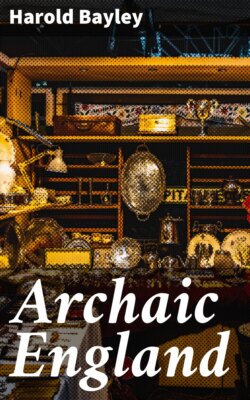Читать книгу Archaic England - Harold Bayley - Страница 4
На сайте Литреса книга снята с продажи.
ОглавлениеFig. 3.—Section of the Dolmen Chapel of the Seven Sleepers near Plouaret.
It has long been generally appreciated that the lives of saints are not only for the most part mythical, but that even documentary evidence on that subject is equally suspect.[37] There is, indeed, no room to doubt that the majority of the ancient saint-stories are Christianised versions of such scraps and traditions of prehistoric mythology as had continued to linger among the folk. To the best of my belief I am the first folklorist who has endeavoured to treat The Golden Legend in a sympathetic spirit as almost pure mythology.
It is usually assumed that at any rate the Christian Church tactfully decanted the old wine of paganism into new bottles; but Christianity, as will be seen, more often did not trouble to provide even new bottles, and merely altered a stroke here and there on the labels, transforming San tan, the Holy Fire, into St. Anne, Sin clair, the Holy Light, into St. Clare, and so forth.
The first written record of Christianity in Britain is approximately A.D. 200, whence it is claimed that the Christian religion must have been introduced very near to, if not in, apostolic times. In 314 three British bishops, each accompanied by a priest and a deacon, were present at the Council at Arles, and it is commonly maintained by the Anglican Church that only a relatively small part of England owes its conversion to the Roman mission of the monk Augustine in 597.
We have it on the notable authority of St. Augustine that: “That very thing which is now designated the Christian religion was in existence among the ancients, nor was it absent even from the commencement of the human race up to the time when Christ entered into the flesh, after which true religion, which already existed, began to be called Christian”.
We should undoubtedly possess more specific evidences of the ancient faith but for the edicts of the Church that all writings adverse to the claims of the Christian religion, in the possession of whomsoever they should be found, should be committed to the fire. It is claimed for St. Patrick that he caused to be destroyed 180—some say 300—volumes relating to the Druidic system. These, said a complacent commentator, were stuffed with the fables and superstitions of heathen idolatry and unfit to be transmitted to posterity.
Mr. Westropp considers that much of value escaped destruction, for Christianity in Ireland was a tactful, warm-hearted mother, and learned the stories to tell to her children. This is true to some extent, but in Britain there are extant many bardic laments at the intolerance with which old ideas were eradicated, e.g., “Monks congregate like wolves wrangling with their instructors. They know not when the darkness and the dawn divide, nor what is the course of the wind, or the cause of its agitation; in what place it dies away or on what region it expands.” And implying that although one may be right it does not follow that all others must be wrong the same bard exclaims, “For one hour persecute me not!” and he pathetically asks: “Is there but one course to the wind, but one to the waters of the sea? Is there but one spark in the fire of boundless energy?”
In the same strain another bard, in terms not altogether inapplicable to-day, alludes to his opponents as “like little children disagreeing on the beach of the sea”.
Although bigotry and materialism have suppressed facts, stifled testimony, misrepresented witnesses, and destroyed or perverted documents, the prehistoric fairy faith was happily too deeply graven thus to be obliterated, and it is only a matter of time and study to reconstruct it. Most of the suggestions I venture to put forward are sufficiently documented by hard facts, but some are necessarily based upon “hints and equivocal survivals”.[38] At the threshold of an essay of the present character one can hardly do better than appropriate the words of Edmund Spenser:—I do gather a likelihood of truth not certainly affirming anything, but by conferring of times, language, monuments, and such like, I do hunt out a probability of things which I leave to your judgment to believe or refuse.
